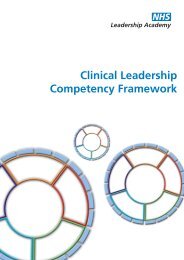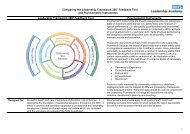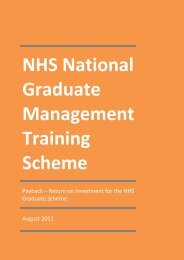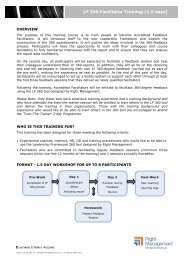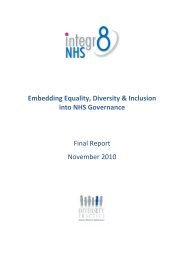Healthy NHS Board: a review of - NHS Leadership Academy
Healthy NHS Board: a review of - NHS Leadership Academy
Healthy NHS Board: a review of - NHS Leadership Academy
You also want an ePaper? Increase the reach of your titles
YUMPU automatically turns print PDFs into web optimized ePapers that Google loves.
Engaging staff<br />
Recent research has identified the value <strong>of</strong> engaging<br />
staff, in terms <strong>of</strong> performance, innovation, alignment<br />
with quality improvement activity, and culture. A recent<br />
<strong>review</strong> presents research indicating that higher levels <strong>of</strong><br />
engagement are associated with better performance<br />
on quality <strong>of</strong> care (for example, patient mortality is<br />
significantly higher in organisations with low staff<br />
engagement than those with high engagement), patient<br />
satisfaction, staff attendance, and finance (West et<br />
al., 2010). However, some research has indicated that<br />
frontline staff do not feel connected to the board,<br />
pointing to imposition <strong>of</strong> centralised solutions that do<br />
not fit with the realities on the ground (Storey et al.,<br />
2010b).<br />
Making the board more accessible to staff may also be<br />
useful. Research recommends the potential value <strong>of</strong><br />
formalising opportunities for staff to present findings<br />
and ideas to the board, for example in terms <strong>of</strong> quality<br />
improvements and innovation (The King’s Fund, 2012)<br />
or by encouraging clinical leaders’ participation in board<br />
meetings and the quality committee (Monitor, 2013).<br />
Evidence recommends that <strong>Board</strong>s should encourage<br />
staff at all levels <strong>of</strong> the organisation to develop and<br />
demonstrate engaging leadership (Welbourn et al.,<br />
2012). Developing opportunities where staff might<br />
reflect on and analyse care provided to patients may<br />
be <strong>of</strong> value in creating a culture <strong>of</strong> engagement. For<br />
example, encouraging process analysis/Lean thinking<br />
techniques, where clinicians and managers collaborate<br />
to analyse patient journeys, may support learning and<br />
identification <strong>of</strong> performance measures that are ‘owned’<br />
at the front line (Storey et al., 2010b). Schwartz Centre<br />
Rounds (described under ‘Shaping Culture’ (Section 3.3))<br />
use a similarly reflective approach to build staff culture<br />
and provide a valuable opportunity for board members<br />
to engage directly with staff (Goodrich, 2011).<br />
Research on board engagement suggests that in larger<br />
organisations there may be value in varying location <strong>of</strong><br />
board meetings. This may ensure accessibility <strong>of</strong> board<br />
meetings to a wider range <strong>of</strong> staff and stakeholders<br />
and provide further opportunities for board members to<br />
engage directly with staff and patients in a wider and<br />
more representative range <strong>of</strong> settings (Alimo-Metcalfe,<br />
2012).<br />
In terms <strong>of</strong> systems to support staff engagement, a<br />
<strong>review</strong> suggests staff are significantly more engaged if<br />
they receive a well-structured appraisal (featuring clear<br />
objectives and leaving the individual feeling valued by<br />
the organisation) than if they receive a poorly structured<br />
appraisal, or no appraisal at all; in addition, a poor<br />
appraisal is (very slightly) worse for staff engagement<br />
than receiving no appraisal (West et al., 2010).<br />
Research on <strong>NHS</strong> Foundation Trusts suggests that staff<br />
as yet are not engaging fully with governance structures<br />
(Allen et al., 2012a). Challenges remain in ensuring that<br />
staff governors feel suitably engaged in their role, and<br />
not constrained by their employee status (Allen et al.,<br />
2012b).<br />
26 The <strong>Healthy</strong> <strong>NHS</strong> <strong>Board</strong>, 2013: Principles for Good Governance



